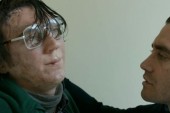
Pictured: Sarah Gadon in Cosmopolis. Image: Screenshot from Cosmopolis
This is part two of an exclusive one-on-one interview with Toronto actor Sarah Gadon.
In the first part of our discussion, I asked Sarah Gadon to shed some light on the manner in which Cosmopolis was brought from book to screen. In this section, we talk about literary adaptation in general, discussing both the limits and opportunities that translating words to cinema creates.
Read More: Sarah Gadon Exclusive: Working with Cronenberg, Robert Pattinson and Adapting Don DeLillo
You often hear that reading a book before seeing a film screws with your mind. You’re able to fill in details that are either poorly sketched in the film, or not elucidated at all. Which I think judges the merits of a movie and misses its singularity. How does this apply to Cosmopolis?
Sarah Gadon: Cinema is its own semiotic language, and you can’t really adapt literature because it’s two completely different mediums presenting a narrative in different ways. Cosmopolis the novel is in the film, for sure, but it’s going to be a different beast. You’re telling the story with images instead of words. DeLillo’s writing is dense. The way his characters think about themselves inside their own heads is something that you can’t necessarily express on film. Film is different from literature and I think people looking to find a connection will always be disappointed. It’s like comparing a photograph to a painting.
Yeah, and book lovers get so ornery when their favourites are brought to screen. But decisions have to be made when you’re translating. And I think that’s a good word, because it’s more than adaptation, you’re changing it into something that speaks another language.
SG: Yeah. If you look at the adaptation of The Cider House Rules, it’s direct. I don’t think Cosmopolis is a direct adaptation. The ideas in that book are so abstract. How do you adapt symbolism? How do you adapt a concept like capitalism? Of course you can continue these ideas onto screen and use the structure from which DeLillo chooses to explore them. But it’s going to be a different exploration.
Of course. I often think that the best book to film adaptations make those decisions. Some are straight up, yet they take a particular interpretation of a book and run with it. Coppola turned The Godfather into an allegory for capitalism. I read the book in high school and–
SG: Did you?
Yeah, I loved the movie that much. But in the movie, Coppola took his interpretation of a pulpy genre story and made it something different in its message.
SG: What I find people critique with Cosmopolis are the things that are closest to the book. For example, people say that the dialogue is theatrical and dense. But it’s word-for-word the dialogue in the book. I don’t understand.
I’ll admit that I get lost sometimes when I read DeLillo’s dialogue. I understand what’s being said, but I lose place of who’s saying what–the voices blend together. Translating that to film might fill in some blanks…
SG: I love the way his characters speak. I think it’s hilarious. I think there’s so much humour in Cosmopolis. There has to be a willingness to see that humour. I think David pulls that out, more so than what I think exists on the page. But when you hear two people saying these lines, you see how funny it can be.
Image: JJ Thompson, for George Stromboulopoulos TonightI know I keep pressing the question, but would reading the book have dampened that type of performance?
SG: It’s not really my job as an actor to think, How is this literary adaptation going to affect the entire story and how people will see it differently. It’s more about what’s on the page. I can read the book and that can be part of the well of knowledge that goes into the character, but I can’t change the fact that I’m doing a Cronenberg film, Rob is the lead, and I’m acting opposite him. These are the tangible things happening I guess you can draw from it, but you can’t let it define your work–because it doesn’t.
Ok, I’m going to goad you on a bit more. Russell Banks has turned his novels into screenplays for Paul Schrader (Affliction) and Atom Egoyan (The Sweet Hereafter) and he sees a difference in the representations of film and literature. He says: “Film doesn’t tolerate a lot of ambiguity, which is one of my trademarks as a novelist. That’s partly because fiction is interactive. The reader brings his or her own interior life to the book. But filmgoers are passive–they can’t fill in the blanks. The medium doesn’t allow it.” Of course, he is a different writer than DeLillo–
SG: And these are different films.
Exactly.
SG: I think it’s important that you mention that because that’s a defining feature of any Brechtian-style work–in theatre or film–that you are trying to provoke your audience from their passive reception of the subject matter into an active relationship with the ideas on screen. I agree [with Banks], I don’t think film is ambiguous. I think that’s part of its beauty. But if you open Cosmopolis on Eric Paker, who is Robert Pattinson, and he’s in a Gucci suit, talking about getting a hair cut, the economy and the cinematic weight that this image holds is something that you could write about for pages. On film, it comes across in one shot.
So, on deck for you is An Enemy, directed by Denis Villeneuve (and starring Jake Gyllenhaal). Another literary adaptation, this book written by José Saramago. Are you going to read it before you start?
SG: I am curious. Sometimes I am wary of reading the source material before I craft my ideas about a character. Because I find that I don’t want to be couched and confined by that description because I’m a person and I will ultimately bring more to that character than a character description. When Denis was showing us some of our camera tests, there was a shot of me pregnant and standing in this lighting he had devised. He said, “This, you can’t write.” And I think that you can’t write certain things that you can show in film. That’s clearly my defence of cinema, and my argument for why it’s a singular artform.
Cosmopolis opens in theatres across Canada this Friday, June 8th.
—
Eli Yarhi is a writer-editor from Toronto.
For more, follow us on Twitter: @TorontoStandard and subscribe to our Newsletter.














